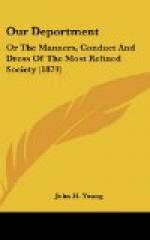The following form will serve as a model:
[Illustration:
1855=1880.
The pleasure of your company
is
requested at the
Silver Wedding Reception
of
Mr. and Mrs. Cyrus Jennings,
On Thursday evening, November
13th at nine o’clock.
25 Jackson Avenue.
R.S.V.P.]
A proper variation will make this form equally suitable for any of the other anniversary weddings.
MARRIAGE CEREMONY AT ANNIVERSARY WEDDINGS.
It is not unusual to have the marriage ceremony repeated at these anniversary weddings, especially at the silver or golden wedding. The earliest anniversaries are almost too trivial occasions upon which to introduce this ceremony. The clergyman who officiates may so change the exact words of the marriage ceremony as to render them appropriate to the occasion.
CHAPTER XXV.
Births and Christenings.
Upon the announcement of the birth of a child, the lady friends of the mother send her their cards, with inquiries after her health. As soon as she is strong enough to permit, the mother returns her own card to all from whom she received cards and inquiries, with “thanks for kind inquiries.” Her lady friends then make personal visits, but gentlemen do not call upon the mother on these occasions. If they wish, they may pay their visits to the father, and inquire after the health of the mother and child.
NAMING THE CHILD.
It becomes an all-important matter to the parents, what name they shall give to the newly-born child, and as this is a matter which may also concern the latter at some future day, it becomes an object of solicitude, until a suitable name is settled upon. The custom in Scotland is to name the first son after the father’s father, and the first daughter after the mother’s mother, the second son after the father, the second daughter after the mother, and succeeding children after other near relations. This perpetuates family names, and if they are persons whose names are regarded as worthy of perpetuation, it may be considered a good custom to follow. With some it is customary to name children after some renowned person, either living or dead. There are objections to this plan, however, for if the person be still living, he may commit some act which will bring opprobrium to his name, and so cause both the parent and child to be ashamed of bearing such a disgraced name. If the person after whom the child is named be dead, it may be that the child’s character may be so entirely different from the person who formerly bore it, that the name shall be made a reproach or satire.
The plan of reviving the old Saxon names has been adopted by some, and it has been claimed that the names of Edgar, Edwin, Arthur, Alfred, Ethel, Maud, Edith, Theresa, and many others of the Saxon names are pleasant sounding and strong, and a desirable contrast to the Fannies, Mamies, Minnies, Lizzies, Sadies, and other petty diminutives which have taken the place of better sounding and stronger names.




